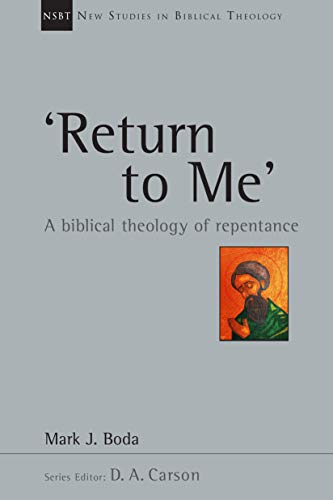A Book Review from Books At a Glance
by G. T. Tran
Summary of Content
In “Return to Me,” Mark J. Boda traces the theme of repentance across the Bible. He defines repentance as “a turn or return to faithful relationship with God from a former state of estrangement” (31).
In chap. 1, Boda provides key vocabularies for the present study. Among several words for repentance in the OT (see 27-28), the most common is šûb (שׁוב), which means to turn or return (25). Although the NT also features a plethora of words associated with repentance, these words sometimes overlap in meaning. For instance, metanoeō (μετανοέω) can denote an inner change (cf. Acts 8:22), but so can strephomai (στρέφομαι) (cf. Acts 7:39) (28-29). All things considered, this list of words alone is not sufficient for the present study because the concept of repentance is also conveyed through “images, forms and concepts” (29-30).
After this brief introduction (chap. 1), Boda treats the theme of repentance in the Torah (chap. 2), the Former Prophets (chap. 3), the Later Prophets (chaps. 4-7), the Writings (chap. 8-10), and sums up his treatment of the OT in chap. 11 which is entitled “Repentance in Old Testament theology.” Boda’s analysis of the NT consists of two chapters (chaps. 12-13). Overall, he contends that the theology of repentance in both the OT and NT is very similar (20). The book ends with some theological implications of repentance (chap. 14).
Evaluation of Content
Boda’s work has many strengths, the most outstanding one is his comprehensive overview of repentance in the OT. He carefully and patiently walks readers through each division in the Hebrew canon (the Law, the Prophets, and the Writings) and shows them relevant passages pertaining to the theme of repentance. His thorough analysis is much needed given the fact that many treatments of repentance tend to focus primarily on the prophetic books (cf. 33), and as a result, texts from the Law and Writings receive little attention. Indeed, the prophetic call to “return to God” does not arise out of a vacuum but is based on the covenantal document outlined in the Law (esp. Lev 26 and Deut 28). Boda’s contribution thus provides a necessary balance in this area of biblical scholarship.
My critique has to do with the space which he allots to examine the NT books. While 10 chapters are devoted to the OT (chaps. 2-11; 127 pages), only 2 are reserved for the NT (chaps 12-13; 28 pages). Boda could have extended his condensed treatment of the NT to at least three or five chapters to do the data full justice.
However, the book is worth the price for its analysis of repentance in the OT alone, and for that reason, it is a great resource to have.
G. T. Tran
